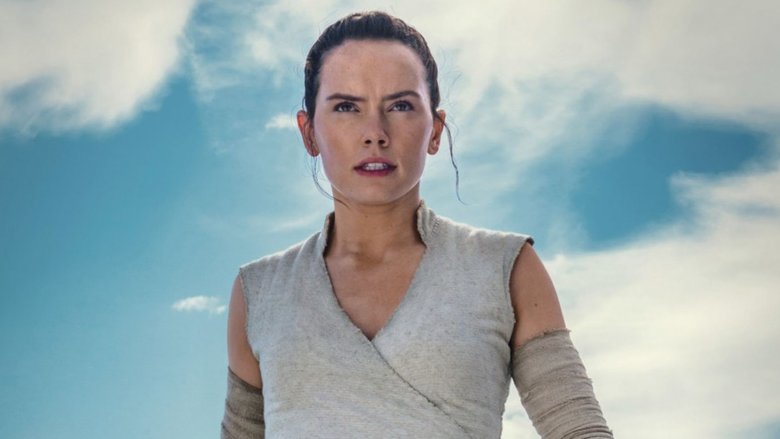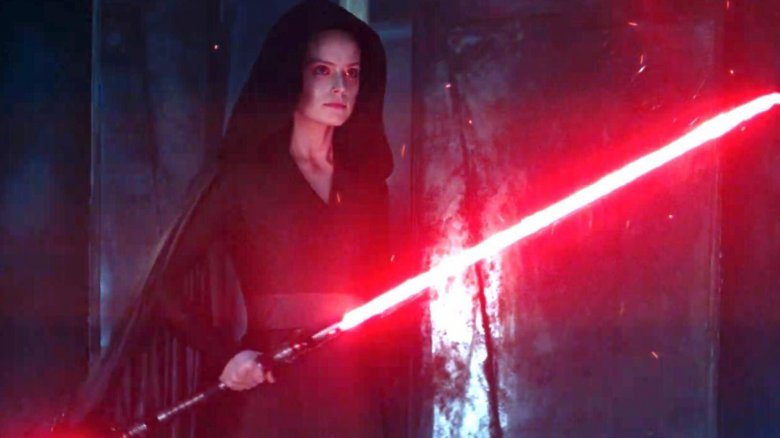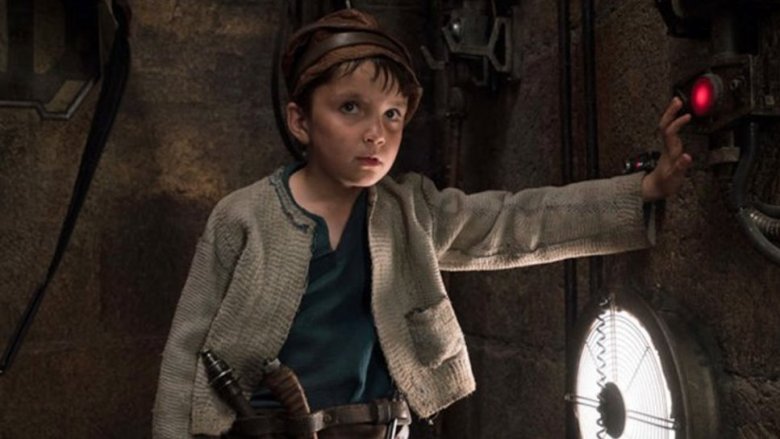The Star Wars Questions Rise Of Skywalker Will Finally Answer
As the Skywalker saga closes out with The Rise of Skywalker, so too will a couple of big mysteries currently lingering in the galaxy far, far away.
In an interview with Empire, The Rise of Skywalker co-writer Chris Terrio confirmed that the flick will finally answer two questions fans have been asking for years — one of which has sparked countless theories, and another that has deeper, franchise-wide implications. The questions that The Rise of Skywalker will unravel are "Who is Rey?" and "How strong is the Force?"
Is Rey a Skywalker, a Solo, or a Palpatine?
As Terrio explained, the question of who Rey (Daisy Ridley) really is has often been wondered about in a literal and a spiritual sense. There's the idea of discovering the truth of Rey's parentage — is she actually the child of two alcoholic junk-traders from Jakku, or does she have a noble bloodline that gives her status in the galaxy? — but there's also the notion of how her ancestry will (or won't) factor into her becoming what Terrio describes as "the spiritual heir to the Jedi." So really, this one question is many questions, which will presumably yield many answers in The Rise of Skywalker.
"We kept coming back to 'Who is Rey?', and how can we give the most satisfying answer to that not only factually — because obviously people are interested in whether there's more to be learned of Rey's story — but more importantly who is she as a character?" said Terrio. "How will she find the courage and will and inner strength and power to carry on what she's inherited?"
Popular theories regarding Rey's parentage point to Luke Skywalker (Mark Hamill), Han Solo (Harrison Ford), and Emperor Palpatine (Ian McDiarmid) as being candidates for the fledgling Jedi's real father.
In The Last Jedi, Luke trained Rey on the remote oceanic planet of Ahch-To, teaching her the ways of the Force and building with her what plenty of viewers felt was something of a father-daughter bond. Certain theory-crafters have used Rey's training on Ahch-To and the dynamic she established with Luke – coupled with her skills in combat, her resilience, and her humor – as the foundation for the notion that Rey is Luke's long-lost daughter. Others have even taken all that into consideration and come up with a different theory: Rey is actually the daughter of Luke's sister, General Leia Organa (Carrie Fisher), Rey's other mentor.
As for how Han Solo might be Rey's real father, some fans feel that Rey's strained relationship with Han's actual child — Ben Solo, better known by his bad-guy moniker Kylo Ren (Adam Driver) — is a sign that she's a Solo as well. That would mean either Han's wife Leia is Rey's mother (making Kylo Ren her brother, which could offer another layer of explanation to their tense connection), or that Han had a child with another woman. In the Legends continuity of the Star Wars universe, Han and Leia have three children, so perhaps Terrio and Rise of Skywalker co-writer and director J.J. Abrams took a tiny bit of inspiration from the non-canonical literature and made it canon in the new movie.
Concerning Emperor Palpatine's potential ties to Rey, there have been numerous theories suggesting that the infamous dark-sider is either the father or grandfather of Rey — and that the cloaked, dual-bladed-lightsaber-wielding Rey seen in recent footage from The Rise of Skywalker may be a version of the character that surfaces after she discovers the truth of her parentage.
There's clearly a lot to think about when pondering who Rey is, and according to Terrio, fans will get a definitive answer in The Rise of Skywalker – plus some additional information about her strength, power, courage, and spirit.
What's ahead for future Force-sensitive fighters
The second big Star Wars question that The Rise of Skywalker will answer is what the Force really is. Again, though this seems straightforward from the outside, Terrio has assured that there's more to it: "It sounds a little simple, but actually when you get down to it, that is a sort of Zen Koan that we would really meditate on — not literally in yoga poses or anything, but like we would discuss, 'What is the Force and how strong is the Force?' Those two things were really important."
In the past, Star Wars has offered a couple of different explanations for what the Force is.
The original films taught us that the Force is a sort of mystical life-force that can embody both good and evil, with Star Wars creator George Lucas having devised the Force as a concept "distill[ed from] the essence of all religions" that could inspire in fans "a certain kind of spirituality" without promoting a particular system of beliefs.
The prequel films brought forth the idea of mitochondria-like organisms known as midi-chlorians, tiny creatures present in all living things that allow their hosts to detect the Force. Lucas explained while speaking with The Phantom Menace novelization author Terry Brooks that Anakin Skywalker is one of the most powerful Force-users in history because there are "like a thousand" midi-chlorians in each of his cells, where there would be "two or three" in average people. He continued, confirming that the way people interact with the Force is through the midi-chlorians: "They are at the core of your life, which is the cell, the living cell. They are in a symbiotic relationship with the cell. And then, because they're all interconnected as one, they can communicate with the larger Force field. That's how you deal with the Force."
This explanation for what the Force is has long left a sour taste in the mouths of Star Wars fans, who felt it took away the idea that anyone could tap into the Force and become a Jedi (or a Sith, if they so chose) without needing to have special blood or superior genes. However, Lucas has maintained that because everyone in the Star Wars universe has midi-chlorians in them, anyone can use the Force. The only catch is that those who become highly skilled in channeling it, like Jedi masters, put extra time and practice into working with the Force. As Lucas previously explained, "Everybody can do it [...] It's just the Jedi who take the time to do it [...] Like yoga. If you want to take the time to do it, you can do it; but the ones that really want to do it are the ones who are into that kind of thing. Also like karate."
Those comments align with what Lucas said about the Force in 1977: "The Force is a perception of the reality that exists around us. You have to come to learn it. It's not something you just get. It takes many, many years [...] Anyone who studied and worked hard could learn it. But you would have to do it on your own."
It seems that the sequel films share the same perspective on the Force as the original films, but it remains to be seen exactly what The Rise of Skywalker will say about the Force. This is especially intriguing given that the Resistance is dwindling; the heroes of the original flicks are either already dead (like Han and Luke) or could be approaching their final days (like Leia, whom many believe will die in The Rise of Skywalker); and the next generation of Force-users will begin to rise soon, as teased at the end of The Last Jedi when a young boy used the Force to pull a broom toward him. Getting an answer to the question "What is the Force?" won't just be satisfying in the present day and current context of the Star Wars films — it will also have an enduring impact on the franchise as a whole as it ventures out into brand-new territory.
Find out the answers to these major mysteries when The Rise of Skywalker hits theaters on December 20.


